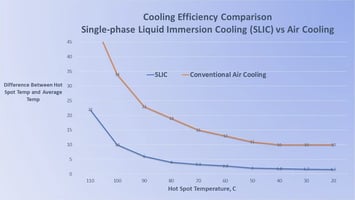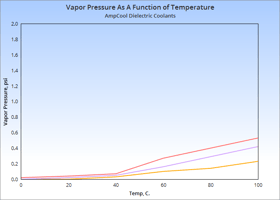SLIC: 1400X More Efficient Than Air Cooling So a customer asked me last week if electronics...
What's Liquid Paraffin?
I received an email from a customer last month, asking about a peculiar term that he heard – “liquid paraffin”. This was being used to cool crypto-mining equipment in an open tank configuration. What’s “Liquid Paraffin” and how is it different from BitCool BC-888 from Engineered Fluids?

The phrase "liquid paraffin" is an antique term that refers to a mineral oil with a paraffinic molecular structure. These are refined petroleum oils. I've worked for decades developing and making dielectric fluids from petroleum oils and from engineered synthetic fluids, and I'm very familiar with the differences.
White mineral oil was developed for the pharmaceutical and lubricant industry, not for use as dielectric fluids. They are not processed to have the basic specifications of a dielectric coolant. These oils have no specifications for, and are not tested for basic characteristics such as dielectric strength, dissipation factor, or interfacial tension.
BitCool BC-888 is not an oil, it's a synthetic fluid specifically made to cool ASICs-based mining equipment. BitCool BC-888 is designed, tested and certified to be compatible with the range of materials that are used in ASICs mining devices. BC-888 is highly processed and comes with guaranteed specifications for all electrical, thermal, physical and chemical characteristics.
Petroleum oils are not tested or certified for material compatibility with the materials used in these devices. The chemical makeup and characteristics of petroleum products vary from batch to batch and from refinery to refinery, because of changing crude oil streams that they use. BitCoool BC-888, being synthetic, is made in a proprietary reaction with tightly controlled tolerances and excellent quality control.
Petroleum oils oxidize, change color and become thicker as they are exposed to heat and oxygen. An engineered dielectric fluid such as BitCool BC-888 does not exhibit this behavior. It won't change color, get thicker, or build up acids that can attack the equipment being cooled.
Another benefit of BitCool BC-888 is that it has a far lower viscosity for the same flash point than petroleum oils have. This means that less power is required to pump BC-888 through your cooling system. This also means that heat transfer efficiency is greatly enhanced because flow is turbulent at lower temperatures. We have customers who have saved tens of thousands of dollars after switching to Engineered Fluids' coolants because their requirements for dry coolers were so much less expensive with our coolants. BitCool BC-888 is far more efficient than petroleum oils in this respect.
Other than these, BitCool BC-888 has large advantages over mineral oils in terms of environmental, health and safety, flammability, and several other categories. Engineered Fluids has written a White Paper that discusses these advantages in detail – you can download it here.
If you have any questions regarding the use of other fluids for heat transfer, let me know. Chances are, we’ll have a good comparison for you.



